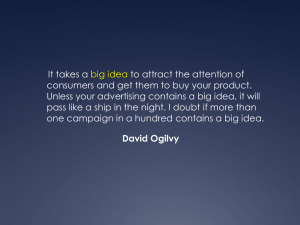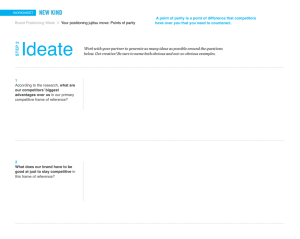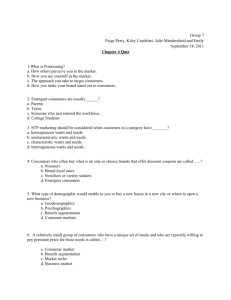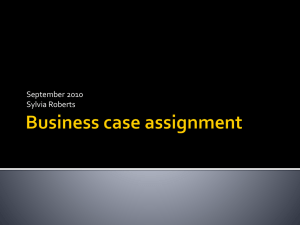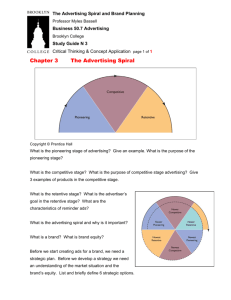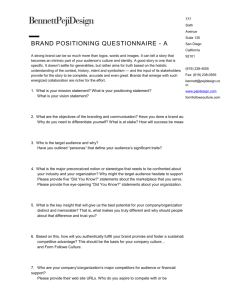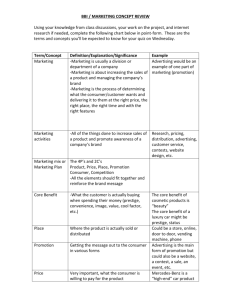Marketing Brands - College of Journalism and Communications
advertisement
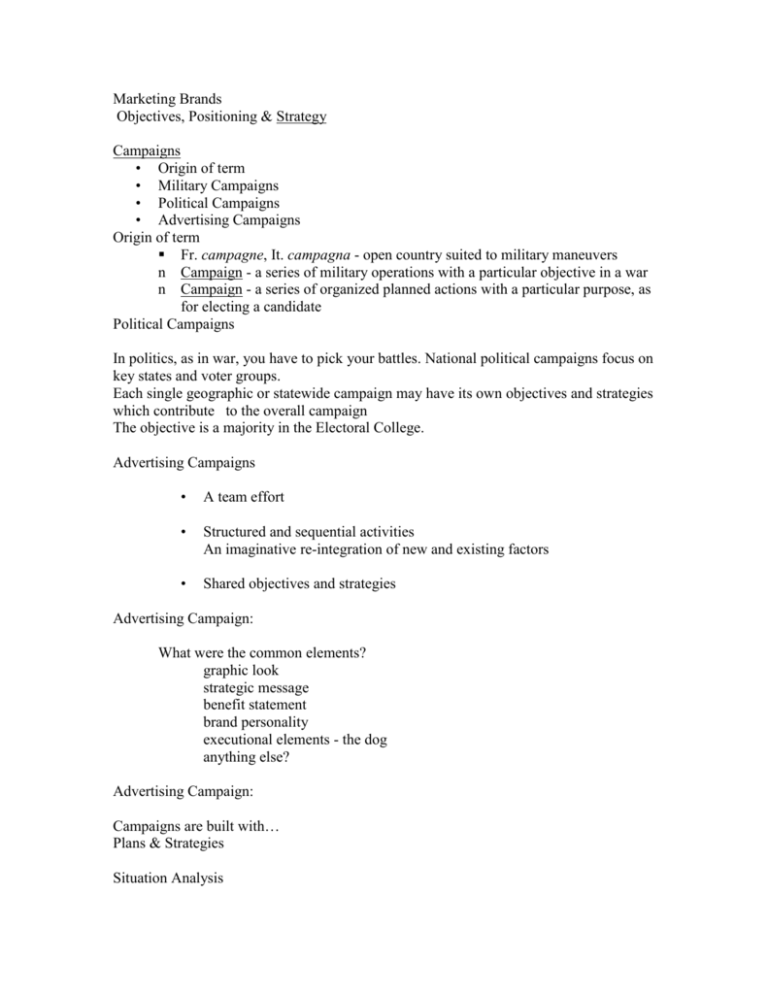
Marketing Brands Objectives, Positioning & Strategy Campaigns • Origin of term • Military Campaigns • Political Campaigns • Advertising Campaigns Origin of term Fr. campagne, It. campagna - open country suited to military maneuvers n Campaign - a series of military operations with a particular objective in a war n Campaign - a series of organized planned actions with a particular purpose, as for electing a candidate Political Campaigns In politics, as in war, you have to pick your battles. National political campaigns focus on key states and voter groups. Each single geographic or statewide campaign may have its own objectives and strategies which contribute to the overall campaign The objective is a majority in the Electoral College. Advertising Campaigns • A team effort • Structured and sequential activities An imaginative re-integration of new and existing factors • Shared objectives and strategies Advertising Campaign: What were the common elements? graphic look strategic message benefit statement brand personality executional elements - the dog anything else? Advertising Campaign: Campaigns are built with… Plans & Strategies Situation Analysis Product Evaluation and History Qualities, Price, Distribution Prospect Evaluation/Target Market Demographics Psychographics Behaviors Competitive Analysis SWOT ANALYSIS Strengths Weaknesses Opportunities Threats Plans & Strategies: Here’s a graphic representation… Marketing Objective Sell one million of product Market Strategy/Creative Establish brand as superior Creative Objective Establish brand as superior Creative Strategy To be determined Market Strategy/Media Target audience W 18-49 Media Objective Deliver Advertising to Target audience W 18-49 Media Strategy To be determined Marketing Objectives Goals for the Product Specific Period Market Share or Sales Goals –Example Increase market share by Jan 2002 Sell 1000 units by January 2002 Vocabulary: Mission: Overall goals & values your “reason for being” Objective: What you want to accomplish. Strategy: How you are going to do it. Tactic: Specific action. (Should be specific action that helps meet strategic goals - tactics should be on strategy.) Remember, objectives first, then strategy. (If you don’t know where you’re going, any road will take you there.) The Value Ladder Value Benefit Consumer Benefit Product Benefit Feature Attribute Some things we know about Advertising Branding and Advertising Branding = overall brand equity building Advertising = specific messages and goals Advertising contributes to Branding Advertising is concerned with: The Advertising Message Media Planning and Placement An Advertising Communication Model Note it is more difficult for the audience to communicate back to the advertiser. Feedback is one purpose of Market Research The Lavidge-Steiner Learning Model How people “learn” ads Begins with Awareness Moves to Conviction and Purchase NOTE: Process may be quite rapid and you may try before being totally convinced Marketing Strategies Product Strategy Functional Appeals Performance Measures Characteristic Features Comparison Information Emotional Appeals Linked with feelings Favorable disposition Reference based Distribution Strategy Cities, Stores, Shelves, Direct Pricing Strategy High Makers Mark---It taste expensive and it is. Low Wal-Mart-Target-K-Mart Product/Brand Positioning DEFINITION -The way in which a product (brand) is ranked in the consumer’s mind by the benefits it offers, by the way in which it is classified or differentiated from the competition, or by its relationship to certain target markets. –In other words how your brand is viewed or perceived by the consumer; what the consumer thinks or feels when she/he is exposed to your product (brand) Key Term : Product Differentiation Major Goal: Make your brand/product stand out in the consumer’s mind Leads to strategy Positioning Strategies Positioning decisions are strategic in nature and provide the direction for a campaign to follow Positioning “By Attribute” Most common method Sets brand apart by performance it offers –Example Lee Jeans is the “brand that fits” Positioning By “Price/Quality In each case “value” must be conveyed in addition to price/quality relation. High price = high quality Low price = adequate quality Example Sears is a “Value” Store Positioning By “Use or Application” Example Arm & Hammer Baking Soda –as a baking ingredient –as a deodorizer –as a tooth whitener Positioning By “Product User” For example Johnson & Johnson’s Shampoo –Originally positioned toward Babies/Infant Usage –Gained added popularity when positioned for adults desiring a gentle shampoo Miller is for blue-collar workers Positioning By “Cultural Symbol” Harley Davidson, “Born in the USA” Positioning By “Competitor” Key strategy, direct comparison to competition Example –Avis positions itself with Hertz Success Stories Marlboro Position not based on any product attribute or benefit Originally a weak brand positioned as women’s cigarette Repositioned as a strong macho brand –Became world’s largest selling brand Success Stories 7-UP Positioning as “Un-Cola” caused retrenchment of entire soft drink industry Caffeine-free position led to many new introductions Planning Introduction A Ten Part Process Evaluation 1. Situation Analysis 2. Research 3. Problems & Opportunities Goal Setting 4. Marketing Objective 5. Budget And then... Building the Plan 6. Strategies 7. Advertising Creative 8. Media 9. Sales Promotion + Other appropriate “IMC” plans and strategies 10. Evaluation
